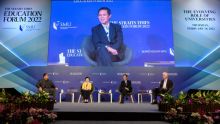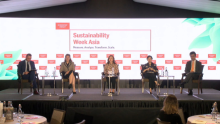SMU Teaching Cases win big at the inaugural Financial Times’ Responsible Business Education Awards
![Two SMU Case Studies were recognised at the inaugural Financial Times’ Responsible Business Education Awards. [Photo: Leo Patrizi, Getty Images]](/sites/engage.smu.edu.sg/files/2024-01/HB%2520-%2520Engage%252023%2520-%2520CWI_0.jpg)
With the rise of sustainability and social impact as key priorities in the global economy, there is an urgent need for business educators to reflect these goals in their teaching. The Financial Times has created a new award to recognise business schools making significant contributions to transforming global practices. The Responsible Business Education Awards 2022 celebrate institutions that have shown leadership in creating more sustainable, environmentally friendly industries through innovative programmes and sustainability management policies.
Two SMU teaching cases on sustainability were recognised: Growing a Global Forest: Ant Financial, Alipay, and the Ant Forest was named the winner of the Teaching Cases on Sustainability; and Bold and Responsible Leadership in Uncharted Waters: The Future of BW Tankers emerged a runner-up. SMU’s teaching cases prioritising sustainability and climate change as key learning objectives.
Written by faculty members and a student from SMU Lee Kong Chian School of Business (LKCSB) Doctoral Research Fellow Ryan Merrill, Associate Professor of Marketing and Director of PhD Programmes Hannah H. Chang, Associate Professor of Finance Liang Hao, and PhD student Ms Lan Yang, in collaboration with Case Writer Ms Adina Wong from SMU Centre for Management Practice, Growing a Global Forest explores sustainability and climate change through a green initiative by Chinese online payment platform Alipay.
Ant Forest is a virtual platform where users could earn energy points and use them to plant and care for trees in a virtual garden, which in turn, would lead to the planting of actual trees upon the maturity of the digital trees in the encroaching deserts of Inner Mongolia.
“Prior to working on this case, we had heard about Ant Forest, a new green initiative under Alipay that has been growing in popularity,” says Associate Professor of Marketing Hannah Chang.
“Those were the early days after the launch of Ant Forest. Some of us were also among the early users participating in it. But what got us thinking more about working on it as a case was when, at a conference, we met a UN representative from the United Nations Environment Programme. What started as a casual conversation led to an interesting discussion on this emerging Ant Forest initiative.”
One of the team's challenges was that the overall topic—relating to sustainability, responsible business, behavioural change of users, and climate change—involved complex trade-offs and no easy answers. In addition, the nature of the case was highly interdisciplinary and required bringing together perspectives and contributions from multiple disciplines, which was challenging in and of itself.”
“We are glad that eventually, by bringing in expertise from different disciplines, we were able to make everything come together,” adds Associate Prof Chang, who suggests that the case can facilitate discussions across Sustainability, Marketing, Strategy, Finance, Game Design, and Behavioural Science.
Meanwhile, Bold and Responsible Leadership in Uncharted Waters: The Future of BW Tankers” by Professor Emeritus of Finance (Practice) Annie Koh, Programme Director of SMU Executive Development (ExD) Dr Flocy Joseph, and Case Writer Cheah Sin Mei from the SMU Centre for Management Practice follows the journey of international maritime group BW Tanker’s Executive Chairman, Andreas Sohmen-Pao. Among the many challenges encountered by the marine industry are tight regulatory requirements, a changing business climate, and the advent of disruptive technology.
Prof Koh and her team first came up with an idea for the teaching case when they sought a case challenge for the University’s Maritime Business and Operations Track (MBOT) students. Around the same time, SMU ExD, which is dedicated to international talent development in a contemporary Asian setting, had also won a tender to conduct a learning journey for senior maritime officers worldwide. The case was published in 2019 and covered multiple macro-environment trends, such as the International Maritime Organisation’s regulations for sustainable shipping, that formed a part of the case.
“We had no idea that Covid would hit the planet in early-2020, followed by the incident of the Ever Given container ship that was stuck in the Suez Canal,” says Dr Joseph.
“These incidents caused disruptions to the supply chain and a renewed focus on the maritime sector. In developing the case, we found out more about BW as a family business and Andreas’ leadership style. As such, we realised that the case is not only suitable for a maritime course, it can also be used to teach about family businesses and leadership.”


